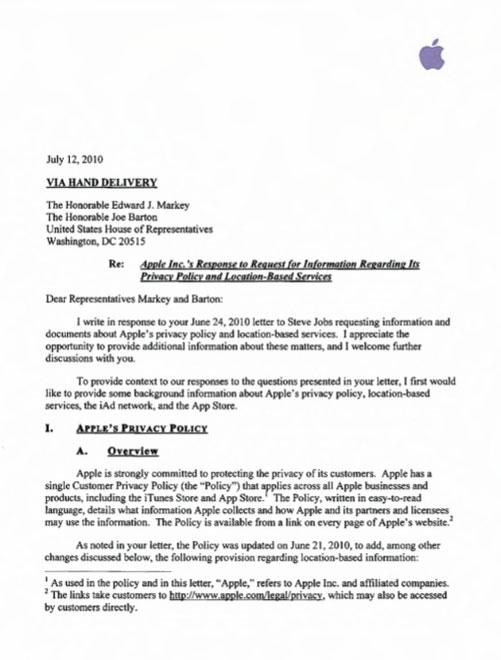Reps. Joe Barton (R-Texas) and Edward J. Markey (D-Mass.) sent a letter to Apple Chief Executive Steve Jobs in June. The congressmen expressed their concerns over Apple's modifications to its iOS privacy policy, and asked for information on exactly what information Apple is gathering on its customers.
Bruce Sewell, general counsel for Apple, responded with a letter dated July 12, which explained the basics of the privacy policy revisions. Last month, the company added a new section to its customer privacy policy entitled "Location-Based Services." Users were required to agree to the new terms and conditions before they could download anything from iTunes or the App Store. Sewell said the company did this to ensure that everyone would see the changes.
The update said Apple and its partners could "collect, use and share precise location data, including real-time geographic location" of a device. The information could be supplied anonymously to help Apple's partners and licensees provide better products and services, but a user's personal information is never shared. Users can opt out of the service by visiting oo.apple.com.
In the letter, Sewell said Apple keeps location data for six months to improve its iAd network. After that, the information is aggregated.
"Apple does not share any interest-based or location-based information about individual customers, including the zip code calculated by the iAd server, with advertisers," the letter reads. "Apple retains a record of each ad sent to a particular device in a separate iAd database, accessible only by Apple, to ensure that customers do not receive overly repetitive and/or duplicative ads for administrative purposes."
He also noted that users have the ability to turn off location-based services in iOS under its settings, and also notifies users in iOS 4 when location based services are in use, through an icon arrow displayed in the system's status bar.
According to ZDNet, both Markey and Barton responded positively to Apple's explanation.
"Apple's responses provided additional information about how it uses location data and the ability of consumers to exercise control over a variety of features on Apple's products, and I appreciate the company's response," Markey said in a statement.
"While I applaud Apple for responding to our questions," Barton said, "I remain concerned about privacy policies that run on for pages and pages. I hope every business uses information for advertising and marketing purposes that will work toward more transparency and complete disclosure about their practices, as well as robust security for the information they hold."
 Neil Hughes
Neil Hughes







-m.jpg)






 Christine McKee
Christine McKee
 Malcolm Owen
Malcolm Owen

 William Gallagher
William Gallagher



 Wesley Hilliard
Wesley Hilliard



-m.jpg)




26 Comments
Now for Google to publish how it uses our information.
Oh, that's brilliant; coming from the U.S. legislative body responsible for producing the U.S. Tax Codes... I think the Human Genome project and Human Genome database is less complex than U.S. Tax Code.
Oh, that's brilliant; coming from the U.S. legislative body responsible for producing the U.S. Tax Codes... I think the Human Genome project and Human Genome database is less complex than U.S. Tax Code.
Or the recent health care bill, or the recent financial reform bill, or the PATRIOT ACT, or TARP, or...
It's transparency for thee but not for me.
Goes to show you those that think we are living in this liberal "they (congress), have to do what we say or we'll vote them out of office are wrong, wrong, wrong. With all the former negative press that I find conflicting, " there is nothing wrong" "all phones does this" to "Apple admits iPhone 4 ds more calls than previous phones"which could be '
an AT&T problem to Free to free cases until Seotember 30th, that congress can make your life he11 if they want. Geesh.
Or the recent health care bill, or the recent financial reform bill, or the PATRIOT ACT, or TARP, or...
It's transparency for thee but not for me.
Now for Google to publish how it uses our information.
You can say that again!!